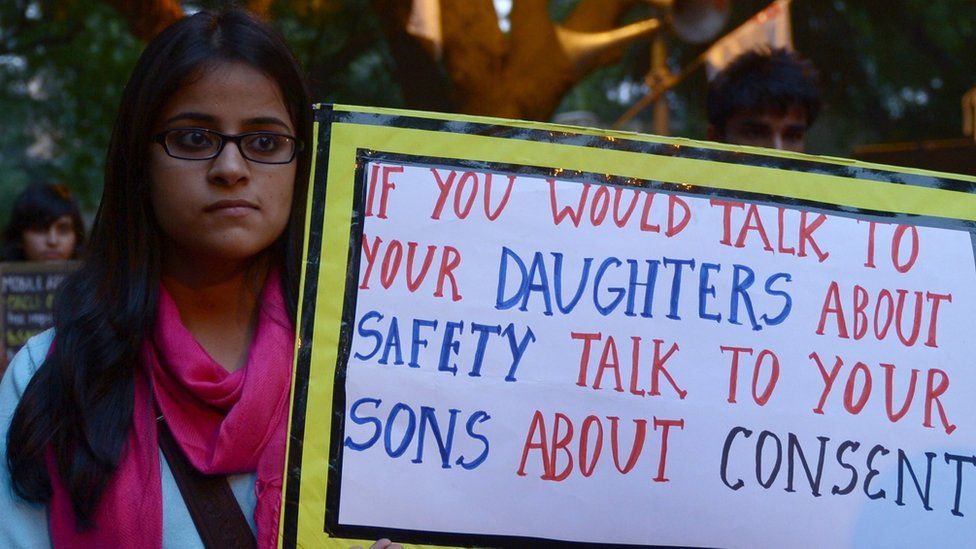India court blames 'promiscuous' rape survivor
- Published

A recent Indian court order suspending the jail terms of three young men guilty of gang-rape and blackmail, even labelling the victim as "promiscuous", stands out for being regressive, writes the BBC's Geeta Pandey in Delhi.
A two-judge bench of the Punjab and Haryana High Court awarded bail to three law students from the elite Jindal Global Law School who had been convicted by a lower court in March for blackmailing and gang-raping a fellow student.
Hardik Sikri and Karan Chhabra were sentenced to 20 years in prison, while their friend Vikas Garg was handed a seven-year term. They were all also found guilty of other crimes and given smaller terms, but these were to run concurrently.
According to court documents, the young woman had a consensual relationship with Sikri in November 2013 which lasted a month, after which she broke up with him.
But for the next 18 months, he used her nude photographs to blackmail her and rape her. Not just that, he also forced her to have sex with his two friends and on one occasion, Sikri and Chhabra gang-raped her.
The convicts appealed in the high court and asked to be freed on bail while the case was being heard - and the court agreed.
In a country where thousands of people under trial languish in prison for decades, often for minor crimes, it is shocking that men convicted of crimes as serious as gang-rape and blackmail were freed on bail.
What is worse is that the short 12-page court order is littered with statements that have been described by the Indian media as some of the "worst examples of victim shaming".
The young woman was castigated for drinking beer, smoking, taking drugs, keeping condoms in her room and not confiding in her parents that she was being abused.
Here are some excerpts from the judgement:
- The victim's testimony "offers an alternate story of casual relationship with her friends, acquaintances, adventurism and experimentation in sexual encounters".
- Her "allegations regarding her being threatened into submission and blackmail lend sufficient diabolism to the offence, but a careful examination of her statement again offers an alternate conclusion of misadventure stemming from a promiscuous attitude and a voyeuristic mind".
- Her "narrative does not throw up gut wrenching violence that normally precede or accompany such incidents".
In their order, Justice Mahesh Grover and Justice Raj Shekhar Attri said they intended "to balance the concerns of the victim, demands of the society and law and the element of reformatory and rehabilitative justice".
"It would be a travesty if these young minds are confined to jail for an inordinate long period which would deprive them of their education, opportunity to redeem themselves and be a part of the society as normal beings," they added.
Predictably, the court order has been greeted with howls of protest in India. Many took to social media to express their anger and the victim's friends started a petition on change.org condemning the judgement.
Supreme Court lawyer Karuna Nundy told the BBC that the order "implies she had no right not to be raped".
A judgement like this, she says, takes away hard-won victories for women's legal equality.
"This order seems to be innocent of the legal definition of consent and of the judgements of the Supreme Court that are quite clear that even a woman of 'easy virtue' may well withhold consent. Any sex after that is rape," Ms Nundy says.
In a society steeped in patriarchy, it's not uncommon for women to be blamed for inviting sexual assault and rape. Victims are often blamed for wearing short skirts or jeans, having boyfriends, being out late at night, or even talking on mobile phones.
In fact, until 2003, we even had a law that allowed victim shaming.
Under Section 155(4) of the Indian Evidence Act of 1872, it was essentially the rape victims who were put on trial and the accused were often allowed to go scot-free if they could prove that "the victim was of generally immoral character".
In 1980, the Law Commission suggested that the archaic law be amended and in 2000, the Commission recommended its deletion, saying that it could destroy a victim's reputation and self-respect.
Decades later, however, victims continue to be shamed.